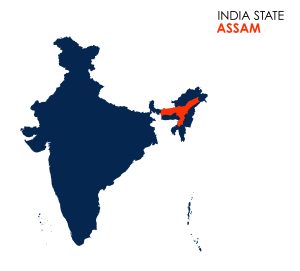The Indian government will provide licenses for firearms to citizens in Assam belonging to indigenous communities living in vulnerable and border zones in India’s Northeast.
The decision is unprecedented and likely to have far-reaching implications for the future.
Assam Chief Minister Himanta Biswa Sarma said the licenses would be issued to citizens, especially those in Muslim-majority districts bordering Bangladesh, to instill a sense of security in them.
Explaining the rationale of the “important and sensitive decision,” Sarma pointed out that members belonging to indigenous communities were feeling insecure, especially in the wake of the targeting of Hindus in Bangladesh in recent months. Demands for gun licenses from people in some regions of Assam have grown over the past several years, he said. Sarma clarified that the objective of the policy was not to militarize the indigenous population in the state.
Four districts in Assam — Cachar, Karimganj, South Salmara, and Dhubri — share a 263-km-long border with Bangladesh. Of Assam’s 27 districts, as many as nine districts have a Muslim majority population, as per the 2011 census; the total number of districts in Assam is now 35.
Obtaining a license for firearms is a long and cumbersome process in Assam that goes through several stages and verifications. Pistols, revolvers, single- and double-barreled 12-bore guns and some rifles can be purchased by those who are granted licenses. Under the existing law, an individual is permitted to get only three firearms.
The Assam government’s policy of issuing gun licenses will not be applicable in districts bordering the states of Arunachal Pradesh, Meghalaya, Mizoram, and Nagaland, owing to the border disputes that have claimed more than 200 lives over the past many decades.
The Assam government plans to launch an online portal to simplify the application process for issuing licenses to eligible residents. The process will begin with a security assessment of the applicant, followed by detailed verification by the concerned government agencies. The decision to issue the license will be taken by the District Magistrate, based on recommendations and reports from other departments. The license will be non-transferable, subject to regular reviews, and can be cancelled if the firearm is misused for criminal activity.
The government’s decision to issue gun licenses in the districts with a Muslim-majority population and those bordering Bangladesh has to be understood in the context of Assam’s rapidly changing demography, the recent spurt in infiltration from Bangladesh, and the government’s efforts to identify and deport the illegal immigrants.
The government’s decision to issue gun licenses in the districts with a Muslim-majority population and those bordering Bangladesh has to be understood in the context of Assam’s rapidly changing demography, the recent spurt in infiltration from Bangladesh, and the government’s efforts to identify and push back the immigrants.
Muslims comprised 30.9 percent of Assam’s population as per the 2001 census. The proportion rose to 34.22 per cent in 2011, which was the highest growth rate among all states in the country.
Although there are three Muslim communities in Assam — Assamese or ‘khilonjia,’ Hindi-speaking and those of Bengal-origin — the Muslim population growth has been the most among the Bengal-origin Muslim community, perceived as a danger by indigenous organizations and political parties. Civil society organizations believe that the unabated influx from Bangladesh has led to the boom in the state’s Muslim population.
Apprehension over the rising Muslim population in Assam also stems from the numerous conflicts in the past between Bengal-origin Muslims and local communities that claimed thousands of lives, and the government’s failure to implement a robust system for the identification and deportation of illegal immigrants.
Two agreements in the past between the All Assam Students’ Union (AASU) and the government — in 1985 and 2005 — and an update of the National Register of Citizens (NRC) completed in 2019 failed to produce results that could have prevented further deterioration of the situation in the state.
Along with the gun licenses, the government has embarked on an aggressive eviction drive of all encroachers from government land, including forests. The government has announced that suspected illegal immigrants would be deported to Bangladesh despite their names being enrolled in the NRC. The Election Commission of India (ECI) has been urged to integrate the results of the NRC with the upcoming special intensive revision (SIR) of electoral rolls.
The opposition Congress has vehemently opposed the government’s decision to issue gun licenses, stating that it will endanger public safety and undermine government authority. Activist-turned-legislator Akhil Gogoi said the policy was a recipe for communal violence ahead of next year’s assembly elections. It is a planned attempt to fuel Hindu-Muslim tensions in the name of protecting those deemed to be original inhabitants of Assam, he said.

































